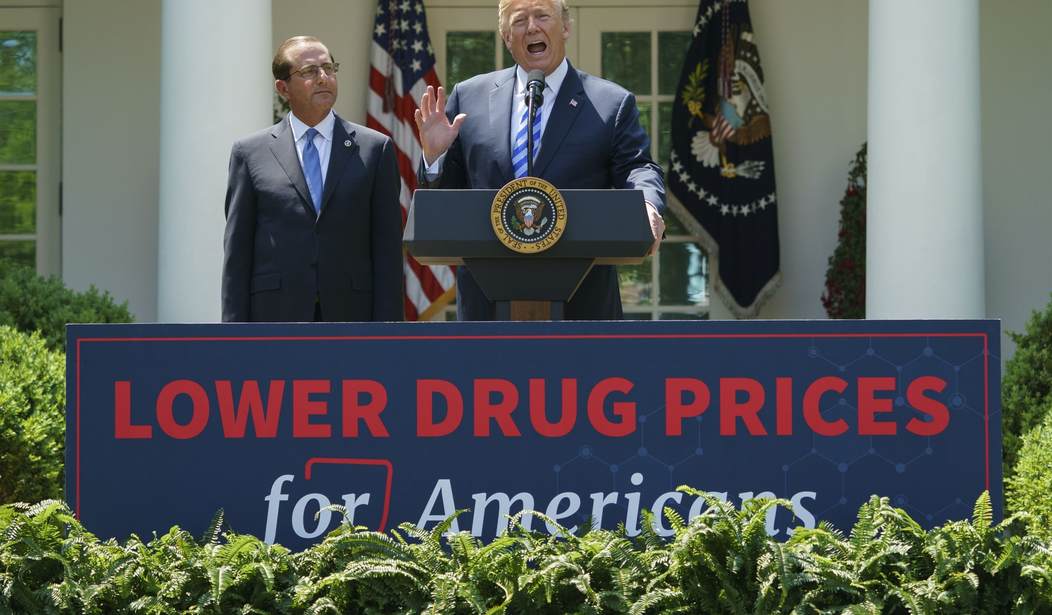President Trump recently promised that "America will never be a socialist country" -- at least not while he's in office.
But some members of his administration didn't get the memo. The Department of Health and Human Services still plans to impose socialist, European-style price controls on advanced drugs administered through Medicare.
The proposal would tie Medicare's drug reimbursement rates to the average prices paid by governments that impose price controls on medicines. HHS officials hope their scheme will reduce pharmaceutical spending here in America -- and force other developed nations to foot more of the bill for drug research and development.
Their plan, though well-intentioned, misses the mark. It rewards freeloaders rather than punishing them. And it would jeopardize Americans' access to state-of-the-art drugs.
Countries with socialized healthcare systems frequently impose price controls on innovative drugs. Governments flat-out refuse to cover medicines that cost more than an arbitrary limit. If manufacturers want to sell their drugs in those countries, they have to heavily discount them.
That forces drug companies to generate a disproportionate share of revenue from countries, like the United States, that have comparatively free markets in healthcare. America accounts for just 5 percent of the world's population and a quarter of the global economy -- but funds 44 percent of global pharmaceutical research and development.
The administration wants to even the playing field by overhauling Medicare Part B, which covers advanced drugs administered in hospitals and doctors' offices. These drugs cost 80 percent more in America than in other developed countries. HHS' plan would gradually ratchet down Medicare reimbursement rates so that the government would pay, at most, 26 percent more than the average developed nation price.
Recommended
The administration hopes this plan will force other countries to pull their weight. But in reality, those governments won't budge. Copying those nations' socialist tactics will only make it harder for Americans to access new therapies.
Already, many of the newest drugs aren't available in developed countries that impose price controls. Only two-thirds of new drugs launched worldwide between 2011 and 2018 are available in the United Kingdom. Roughly half are available in France and Canada. By contrast, 88 percent of those new drugs are available in the United States -- including nearly 95 percent of new cancer medicines.
Americans gain access to the latest cancer drugs an average of two years sooner than patients in Germany, France, and the United Kingdom. For a patient with terminal cancer, those two years could mean the difference between life and death. Unsurprisingly, cancer death rates in the United States have been falling for 25 years.
Price controls would also subvert efforts to develop cures for deadly diseases.
Medical research is a risky business. It costs $2.6 billion, on average, to develop a single new drug. And close to 90 percent of experimental treatments fail to gain FDA approval. Only the potential of profit incentivizes investors to fund these long-shot projects.
Price controls make it difficult -- if not impossible -- for companies to recoup their upfront costs, let alone earn a profit. They thus kill the incentive to invest in cures. If HHS adopts these price caps, drug development will grind to a halt -- and patients will suffer.
Fortunately, the president can end foreign freeloading without harming patients. Negotiating better trade deals could stop foreign governments from effectively robbing American innovators.
For instance, it's completely unfair that Germans pay far lower prices than Americans for drugs invented in U.S. labs. Perhaps a special negotiator with the U.S. Trade Representative -- one who focuses solely on medicines -- should threaten tariffs on every Mercedes, BMW, and Volkswagen until the German government fairly values American medicines.
Fighting socialism with socialism will only harm patients. Let's hope President Trump nixes HHS's plan and finds a more effective way to hold foreign freeloaders accountable.
Stacy Washington is a decorated Air Force Veteran, an Emmy nominated TV personality, and the host of the nationally syndicated radio program “Stacy on the Right.”























Join the conversation as a VIP Member